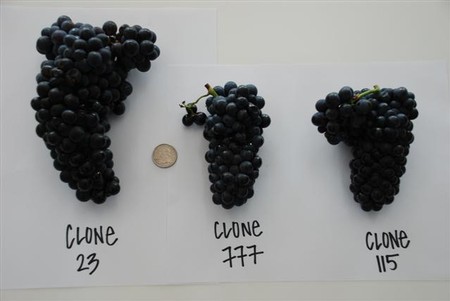Pinot Noir: Clones
Winegrowers and winemakers often mention clones. I had the basic idea of what they are, but wanted to know more. The perfect opportunity arose with our Pinot Noir.
First, what are clones? There are many types of the same varietal from different sources, and when compared there are differences. These differences are caused by alternations in genes that control characters such as berry color and size, disease resistance, and ripening time. Over time the varietal alterations build up and result in greater diversity in varietals. This diversity is a clone.
Today there are many clones available to growers that enhance viticultural performance, wine quality, and help create a particular wine style. To help show the differences in a varietals clone, let’s take a look at our Pinot Noir clones 115, 777, and 23 (Mariafeld).
Our Pinot Noir Clones
Clone 115
French clone. Compact-berried winegrape bunch. Slight resistance to botrytis. Regular yields, complex, and powerful wines. Good ratio between fruit-flesh and berry skin so a higher aroma and color extraction can be achieved. Perfect for aging.
Clone 777
Similar to 115. French clone. Compact-berried winegrape bunch. Slight resistance to botrytis. High color, nice tannins, and aromatic. Good ratio between fruit-flesh and berry skin so a higher aroma and color extraction can be achieved. Perfect for aging.
Clone 23 – Mariafeld
Swiss clone. Loose-berried winegrape bunch. Higher resistance to botrytis. High yields, large berry size, good color and tannin structure. Gives wine a plush body with balanced character. Nice for sparkling wines.
This year we are crafting a wine using clone 115 and 777. Before we harvested I had a chance to taste the berries and what a difference between the two! 115 has smooth skin and more of a fruit and spice balance, whereas 777 has a tougher skin and a little less flavor profile, just as a the descriptions above noted.
I wish all the above information was directly from me, but I’m learning too! I pulled information from the Foundation Plant Services at UC Davis, and the book Wine Grape Varieties in California.
Stay tuned for more Pinot Noir details!
